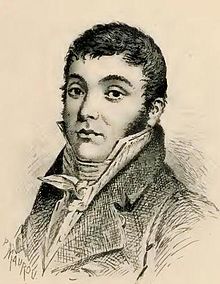Jean Joseph Marius Diouloufet

Jean Joseph Marius Diouloufet (19 September 1771, in Éguilles – 19 May 1840, in Cucuron) was a Provençal poet.
Biography[edit]
As a seminarian, Diouloufet had to leave Provence for Italy with the advent of the French Revolution.
Under the Empire, he became a trader in Aix-en-Provence.[1] He made friends with Ambroise Roux-Alphéran, who lived on the same street as him.[2] A librarian in Aix, he was dismissed during the French Revolution of 1830.
His Provençal poetry, fables and tales didn't go unnoticed at the time of publication.[citation needed] His work is pervaded by the use of a very raw strand of Provençal. By the end of his life, he finished a French-Occitan dictionary.[3]
Bibliography[edit]
- 1819 : Lei Manhans (« silk verses » in provençal), poem in four parts (Leis Magnans, pouémo didactique, en quatre chants, eme de notos de la coumpousitien de M. Diouloufet)
- 1823 : Co-writes an anthology, Lo Boquet provençau.
- 1829 : Fablos, contes, epitros et autros pouesios prouvençalos (« Fables, poetry, epistles and other provençal poems »).[5]
- 1841 : Le Don Quichotte philosophe ou Histoire de l'avocat Hablard.[6]
Roux-Alphéran also mentions « his pleasant songs, popular throughout the South of France from 1814 to 1815 », namely Alléluia on the return of the Bourbons.[4]
References[edit]
- ^ René Merle - “L’écriture du provençal” Archived 2007-09-28 at the Wayback Machine
- ^ rue Longue-Saint-Jean, now named after Roux-Alphéran: Le quartier Mazarin d'Aix-en-Provence. Archived 2011-02-20 at the Wayback Machine
- ^ Antiquarian Books :: ILAB-LILA :: International League of Antiquarian Booksellers
- ^ a b Les Rues d'Aix, Roux-Alphéran, 1846-1848.
- ^ livre-rare-book.com : site professionnel de livres d'occasion, anciens et modernes Archived 2007-09-27 at the Wayback Machine
- ^ Straat Antiquaren Catalogus Archived 2001-03-03 at archive.today
